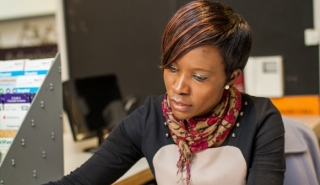#OneTrustOneTeam
Click on the photos below to read our stories
This site uses cookies. By continuing to browse the site you are agreeing to our use of cookies. Find out more here. Hide this message
You are here: Home > News and media > #OneTrustOneTeam
Click on the photos below to read our stories
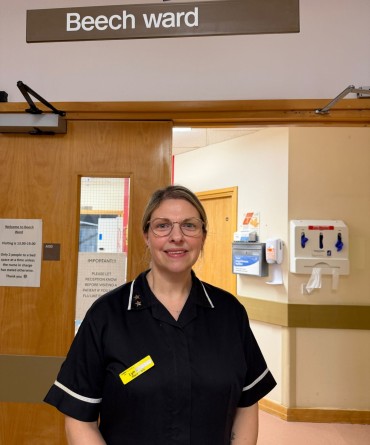
Say hello to Lyn, Ward Clerk at Scarborough Hospital.
I work on Beech Ward, which specialises in respiratory, cardiology, and some general medicine. My role is both administrative and supportive, helping the ward run smoothly, completing key admin tasks, and supporting patients and families.
I’ve been at the Trust for 13 months and have witnessed immense care and compassion from my colleagues in that time. I’m a change maker and a digital champion for Nervecentre EPR. I love to make a difference and am excited to help our Trust be a great place to work for all.
A special moment for me is seeing the gratitude on colleagues’ faces when I thank them each week for their hard work. It means even more when new F1 doctors tell me how welcomed they feel and that I go above and beyond my usual duties. These interactions remind me that small, intentional acts of kindness and support can make a real difference to our team’s morale.
Nervecentre EPR means colleagues will be able to be more present with patients by replacing paper notes and frustrations with unreadable handwriting with instant, accessible digital records. It will create one clear source of truth with a full audit trail. This reduces time spent searching for information and ensures all colleagues contribute to patient records in a timely way, rather than tasks being left for the next colleague/shift. Our colleagues will feel more informed, enabling them to confidently update patients and families.
Colleagues can reach out to me directly or any of the other digital champions. They can also attend upcoming drop-in sessions in Pat’s Place on Wednesday mornings. It’s a great chance to see the system or ask the team any questions.
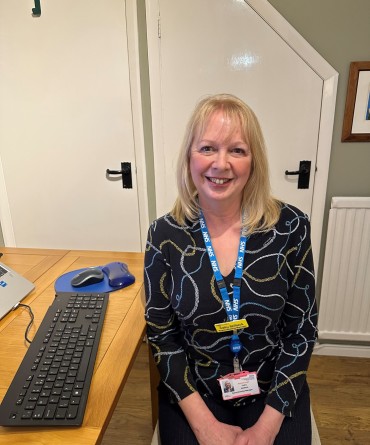
Say hello to Cathy Skilbeck, Apprenticeships Manager
Tell us about your role
My main responsibility is to champion apprenticeships and lead on developing opportunities which empower staff development, regardless of role or grade. Apprenticeships are a fantastic way for our employees to improve their skills while continuing to work at our trust, which ultimately brings benefits to patients with improvements in care.
How long have you been at the Trust and why do you like it?
I am delighted to say that I have been with the trust for 37 years come this October! I joined as a student nurse and since then I have been fortunate to have had a varied career, working in many different roles. Now I’m working with my amazing colleagues in the Apprenticeship team and I have seen many improvements over the years. I am proud to be part of such a friendly, caring and compassionate organisation.
Have you experienced any special moments at work?
It is such a privilege and so rewarding to be able to support staff to progress personally and professionally using the apprenticeship route. There have been many occasions where people have started their learning journey with gaining Maths and English qualifications, and progressing through apprenticeships to become, for example, a registered nurse, physiotherapist or operating department practitioner.
Who is your role model at the Trust, and why?
I have worked with so many inspiring people throughout my career, but I want to give a shout out to my colleagues in the Apprenticeship team, who inspire me on a daily basis with their enthusiasm, energy, dedication, hard work and support.
National Apprenticeship Week is taking place next month. Why is it important, and what would you say to anyone considering an apprenticeship to develop their career?
I’d say, ‘You don’t know what you are missing!’ There are so many apprenticeships available – 65 across clinical and non-clinical roles – all fully funded, and you get paid to learn. They’re a fantastic way to grow your own skills and knowledge, support career progression, enable teams to develop workforce ambitions and contribute in some way to providing the best possible care for our patients.
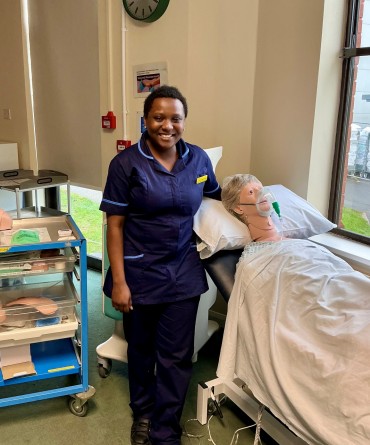
Say hello to Liz Alinaitwe, Global Majority Nurses Team Leader
I support internationally recruited and global majority nurses through the Stay and Thrive programme, helping them settle, build confidence and reach their potential. My role includes OSCE support, induction and preceptorship, plus making sure new colleagues feel genuinely welcome through buddying and tailored wellbeing support.
Building a sense of belonging is key. We help colleagues feel included and connected, with networks where people with similar backgrounds can support each other. Integration can be hard, so what we offer needs to be personal, person-centred, and focused on colleagues' growth at work and in their personal lives.
We also support with interview skills, because interviews here can be very different from those in other countries. We go through techniques and common questions, and how to prepare, helping make the process fair and giving everyone the best chance to succeed.
I joined in October 2019, and I absolutely love it here. I’ve found a real community - not just at work, but in my life outside of it, too. I’ve felt so supported, and the people who’ve helped me along the way have shaped who I am. I’ve made so many friends, and I’ve really grown here. At my wedding, over 150 of the guests were people I’d met since joining - that says everything. I feel a real sense of community and feel loved here.
My standout proudest moment was being awarded the Chief Executive’s Award in 2023 at the Celebration of Achievement Awards. I was simply overjoyed - I felt so moved and honestly couldn’t quite believe it. I even slept with my trophy in my bed that night!
My role model would be Emma George, Assistant Chief Nurse. I just love her compassion. And when she says she’ll do something, she does it. She’s so easy to work with. Also, Matron Sam Soulsby - she has supported me and worked with me so much. She’s a really good listener, and she’s very inclusive and compassionate. She gave me so much time, especially when it came to helping me with my interview techniques.
Be kind and be compassionate. We don’t know what people are going through in their day. As my grandma taught me, even just a smile can brighten someone’s day.
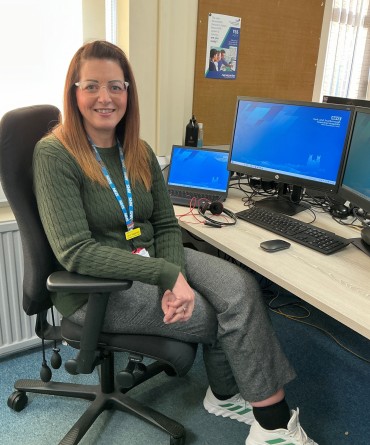
Say hello to Jenn Haggerston, Information Governance Officer.
I lead on Freedom of Information requests, helping to ensure transparency and accountability. Every request tells a story - whether it’s about public spending or patient admissions. I also play a role in safeguarding patient data. Protecting information isn’t just a responsibility, it’s a commitment to safety and confidence in the care we provide.
I’m approaching five years with the Trust and have truly found my home in the Information Governance Team. I’m fortunate to work with a team that values growth and collaboration. The work can be challenging yet fascinating, giving us the chance to engage with every department. Being York-born, the Trust holds a special place in my heart. I was an inpatient last year and experienced exceptional care firsthand. That reinforced why our work matters - protecting patient data and supporting safe, transparent care.
One of my proudest achievements was gaining my qualification as a Practitioner in Freedom of Information - it was top of my goals list. Recently, I was promoted to Information Governance Officer, which has been an exciting step forward. I’m also proud of the impact I’ve made on FOI compliance. When I started, compliance was just 42%, but through hard work and collaboration, we’ve consistently maintained figures in the 90s. It’s a real testament to strong processes and teamwork, and seeing those results has been incredibly rewarding.
Network! Take the time to connect with colleagues beyond your own team. We have so many amazing people with a wealth of experience, and learning from them has made a huge difference to my role. I wouldn’t have achieved the results I have without building those relationships. Don’t be afraid to push yourself forward.

Say hello to Noella Isibor, Domestic Assistant at York Hospital.
Through December, we’re adding a bit of festive sparkle to our weekly #OneTrustOneTeam campaign, featuring colleagues with festive names and taking a peek behind the scenes at how our people are celebrating this Christmas
I help keep our hospital clean, safe, and welcoming for everyone. I support different wards and areas with cleaning and catering, making sure patients and colleagues are comfortable and well looked after. I am part of the invisible magic that keeps the whole place running smoothly.
This is my second Christmas with the Trust. I’ve officially moved from “newbie” to “I know where every cupboard, corridor, and secret stash of biscuits is!”
We’re spreading joy the simple way: warm smiles, friendly chats, a positive atmosphere, and making the environment feel lighter and more festive. Even if people can’t be home for the holidays, we try to bring a bit of that warmth to them. And yes, I’m fully ready to hum Christmas songs while working.
I would be Buddy the Elf - full of enthusiasm, optimism, and just the right amount of festive energy. I love making people smile and keeping spirits high, especially at Christmas.
I have not nominated anyone yet, mainly because it would be a hard choice! The members of my team are always up and doing, supportive, and hardworking, especially during the busy Christmas period. Everyone really deserves recognition for the effort they put in every day.
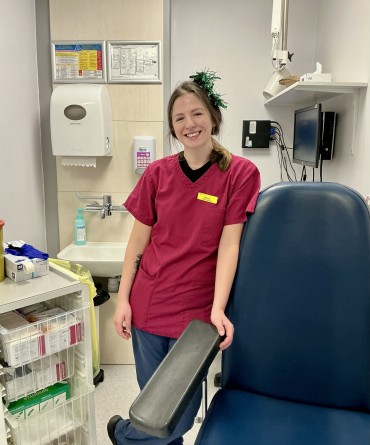
Say hello to Becca Snow-Holliday, a Phlebotomist based at York Hospital.
Through December, we’re adding a bit of festive sparkle to our weekly #OneTrustOneTeam campaign, featuring colleagues with festive names and taking a peek behind the scenes at how our people are celebrating this Christmas.
My role as a phlebotomist includes working in different areas of the hospital, both inpatients and outpatients, taking blood and delivering it to the labs. This means patients get results quicker and more efficient to fast track better health.
10 in the NHS! Five of those in Scotland, one in Lincoln, and four here at York.
I believe cheer is spread with good attitude, some tinsel in the hair, music, and a big ol’ smile!
Us phlebotomists would be The Grinch. Everyone dislikes seeing us arrive to visit them, but by the end of their time with us, they get to know us – as we do them – and understand we care and our doing our bit to help them get better.
I haven’t nominated anyone yet but, wow, who would I choose? Our team is so resilient and hardworking – I think every one of them deserves it!
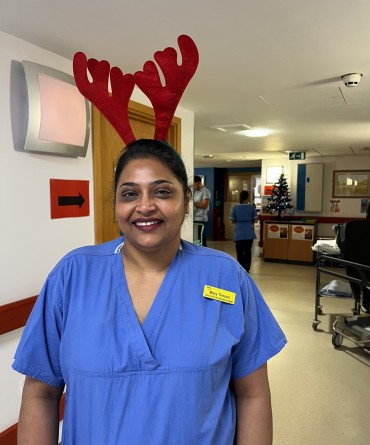
Say hello to Mary Joseph Timson, Clinical Educator in Theatres and PACU.
Through December, we’re adding a bit of festive sparkle to our weekly #OneTrustOneTeam campaign, featuring colleagues with festive names and taking a peek behind the scenes at how our people are celebrating this Christmas.
As a clinical educator, my role is to build confidence, enhance competence, and promote excellence in patient care by providing colleague education, assessing skills, and supporting continuous professional development.
This year marks my 20th Christmas at the Trust and, over the past two decades, colleagues have become family, sharing kindness, supporting each other through every challenge, and celebrating countless moments of excellence together. At Christmas, that sense of togetherness shines even brighter. Here’s to another season of compassion and festive cheer!
Christmas, to me, is a season of faith, reflection, and gratitude... a time to pause, appreciate our blessings, and come together with family, friends, and the teams we work alongside. In theatres and PACU, we often meet patients when they’re at their most vulnerable, and the festive season can make those moments feel even more poignant. Offering comfort, reassurance, or even a small smile reminds me that Christmas is really about compassion, connection, and caring for one another. As a small clinical education team across sites, we may be few, but we’re driven by kindness.
This year, we’re adding festive touches to shared spaces, bringing in treats and warm drinks, and adding some seasonal fun to our teaching sessions. We’re also taking time to celebrate together, sharing a Christmas meal at Ellerby’s, joining Trust-wide competitions, and attending department festivities. Above all, we’re checking in with colleagues, offering support and encouragement during this busy period. Our aim is simple: to help ensure that everyone, patients and staff alike, feels valued, supported, and cared for during this special season.
I’d be like the guiding star in The Nativity Story, not the main character, but a light that helps others find their way. As a Clinical Educator in theatres, I see our roles as a guiding star helping colleagues shine, sharing knowledge, and creating a calm, supportive environment.
Yes, I have! I nominated colleagues for the Kindness Elf Award and the Hidden Hero Elf Award because they truly embody the spirit of Christmas in theatres. They’re the first to offer help, the first to lift others up, and the last to seek recognition for themselves. Their kindness and openness create a supportive environment, and their dedication and calm presence ensure excellence in patient care, even when the festive season gets hectic. It felt important to celebrate the light they bring to our team and the difference they make every day.
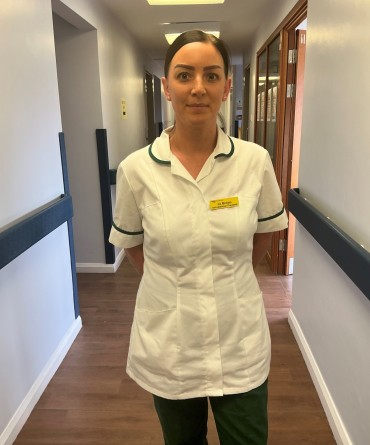
Say hello to Jo Brown, an Occupational Therapist based at Nelsons Court.
I’m a newly qualified Occupational Therapist (OT), having completed a three-year apprenticeship. I help inpatients regain their independence and improve their quality of life through meaningful, goal-based rehabilitation. My role is not just about the physical needs of my patients, but the emotional, cognitive, and environmental factors that may impact their recovery, too. Every day is different, and the work is incredibly rewarding, particularly when I see patients making progress.
I’ve been at the Trust for five years. I initially began on the wards and stroke unit as a rehabilitation assistant. From day one, I’ve been surrounded by supportive colleagues who have helped me learn, grow, and develop my confidence. What I value is the culture of learning and encouragement. Even as an apprentice, I was given opportunities to contribute meaningfully to patient care, and I still feel supported and empowered now.
One moment that stands out is supporting a palliative patient at the end of life to fulfil his final wish of seeing his beloved dogs. Facilitating that experience, and witnessing the comfort and joy it brought him, reinforced the importance of holistic therapy. Moments like that remind me why I chose this profession.
My former stroke team colleagues have been a constant source of support, encouragement, and inspiration. From the start of my apprenticeship, they welcomed me and invested time in my development. Their dedication to patient-centred care, clinical excellence, and teamwork has set a standard I strive to meet. Also, a huge shout out to my apprentice colleagues, Lindsay Ward and Nicky Allton: both have been my rocks. We all have worked incredibly hard to achieve our degrees. I’m incredibly grateful to learn from such passionate professionals, and I hope to continue growing within the Trust and give back in the same way they have for me.
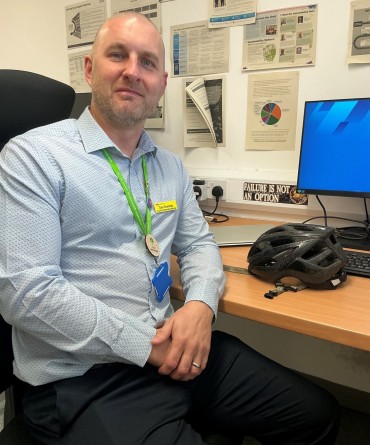
Say hello to Dan Braidley, Travel & Partnerships Manager
I’m part of the Trust Sustainability Team and my work contributes to the wider Trust sustainability agenda as we deliver our net zero carbon targets. I work closely with local authorities to make sure we align with their green aspirations, and a big focus of my work is on building relationships and finding areas where we can use better and greener travel and transport.
I’ve been working with the Trust for nearly 10 years. I genuinely enjoy my job. Everything I do is a team effort and my role often involves pulling everything together. Ultimately, any job is only as good as the people you work with; and I’m lucky enough to work with some genuinely great people both in our Trust and externally.
My role is fairly unusual, and I get to be innovative and represent the Trust regionally and nationally. I’ve built a network over the last 10 years with local authorities, transport providers, and NHS colleagues. I also like the fact that I’m very much ‘behind the scenes’: I do my little bit to ensure we are represented when some fairly major regional decisions get made, which ultimately helps us deliver our services to patients.
I think that the delivery drivers are our unsung heroes. They deliver bed linen, samples, drugs, and post all year-round in all conditions, and regardless of any operational or logistical issues. Phil Bland, who manages the service, has been great to work with over the years.
Mental health issues do not discriminate; it will affect us all at some point and it’s also important to keep ourselves on track throughout our day-to-day activities. I’m a founding member and trustee for Menfulness, a York-based men’s mental health charity. We’ve referred hundreds of men to counselling and engaged with thousands more who have benefitted from it makes me hugely proud.
Providing care together in York, Scarborough, Bridlington, Malton, Whitby, Selby and Easingwold communities
© 2026 York and Scarborough Teaching Hospitals NHS Foundation Trust | Accessibility | Site map | Cookies policy
York and Scarborough Teaching Hospitals NHS Foundation Trust is registered, and therefore licensed to provide services, by the Care Quality Commission (Provider ID: 1-114394658). For more information, visit www.cqc.org.uk

